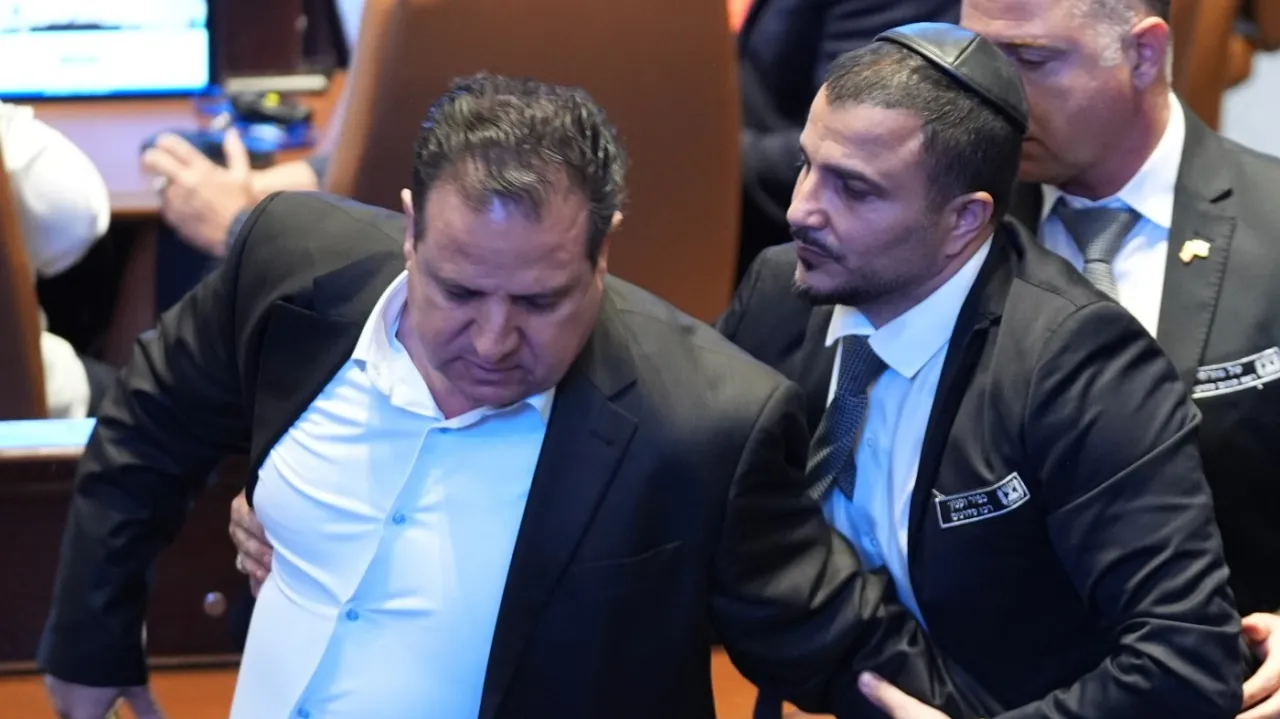
2 lawmakers ejected from Knesset after disrupting Donald Trump’s speech
President Trump’s speech at Israel’s Knesset, its parliament, was briefly interrupted by lawmakers who were expelled from the plenum after shouting slogans during Trump’s remarks.
Those protesting were Ayman Odeh, an Arab Israeli and member of the Hadash Alliance, and Ofer Cassif, a far-left politician who is the only Jewish member of the Hadash coalition.
Odeh, the head of the Hadash party, held up a sign that said “Recognize Palestine” when he was ejected from the room. He later wrote in a post on the social platform X that he is calling for recognition of a Palestinian state as “the simplest demand, a demand that the entire international community agrees on … There are two peoples here, and neither is going anywhere,” the post read in Hebrew, as translated by X.
Cassif also posted on X that the protest was “to demand justice,” accusing the Israeli government of occupation and apartheid against Palestinians.
“Refuse to be occupiers! Resist the government of bloodshed!” read that post, also translated from Hebrew.
Israeli Prime Minister Benjamin Netanyahu has rejected agreeing to the recognition of a Palestinian state, even as he has signed on to Trump’s 20-point peace plan, which is supposed to lead to a sovereign Palestine.
Still, Trump has not joined the majority of the international community in presently recognizing a Palestinian state.
The protest against Trump’s speech came as the president was marking the return to Israel of the last living hostages held by Hamas since they were kidnapped during the Oct. 7, 2023, attack by the Palestinian militant group.
It marked a major milestone in the first phase of a deal to end the fighting in Gaza.
While a majority of Israelis favored a ceasefire deal with Hamas to secure the release of the hostages, the population is deeply divided over the way Israel might deal with Palestinians in their own aspiration for a Palestinian state.
Only 21 percent of Israelis believe that Israelis and Palestinians can coexist peacefully, according to a survey conducted by the Pew Research Center earlier this year.
Odeh and Cassif are members of an Arab-Jewish political party that holds five seats in Israel’s opposition. It is the second most popular Arab political party, but it generally receives a small number of seats in Israel’s Knesset. Arabs in Israel make up about 20 percent of the population, split between Muslims and Christians.
Arab voters in Israel typically have a lower voter turnout compared with Israeli Jews, but that has changed in recent years as Arab leaders like Odeh have encouraged political participation. Arab Israeli turnout in the 2022 elections reached 53.2 percent.
Odeh became head of the Hadash party in 2015 and was considered a rising star in Israeli politics who advocated for uniting the disparate Arab parties to increase their influence in the Knesset, securing 13 seats at the time.
He capitalized on his popularity by carrying out a four-day trek from the Negev desert to Jerusalem, raising awareness and bringing attention to the rights of Bedouin people in Israel.
In 2019, Odeh put his backing behind Benny Gantz, head of the centrist Blue and White party, for prime minister to block Netanyahu from forming a coalition and taking power. But Odeh was criticized for his support when Gantz teamed up with Netanyahu in a power-sharing coalition after a year of deadlock on coalition negotiations.
Cassif, meanwhile, joined the Hadash party in 2019 and is described as a firebrand. He was initially blocked from running by Israel’s Central Election Commission, citing provocative comments he made in the past, including calling a justice minister “neo-Nazi scum,” The Times of Israel reported at the time, but the Israeli Supreme Court overruled that decision. That same year, Cassif also accused Israel of carrying out a “creeping genocide” of the Palestinians.
In 2024, Cassif supported a South African measure to hold Israel accountable for genocide at the International Court of Justice (ICJ).
In November, Cassif was suspended from the Knesset for six months for supporting South Africa’s ICJ case and other comments he made related to the Israel Defense Forces and the war in Gaza.
After getting removed from the Knesset on Friday, Cassif posted on X a video of the plenum cheering his removal, criticizing them as showing “the U.S. President and the entire world that there is no room to express a different opinion in Israel.”
“The face of ‘the only democracy in the Middle East’ is not particularly pretty,” he wrote.
Likewise, Odeh has a history of speaking out in the Knesset and was the subject of a failed impeachment measure filed after he equated the release of hostages held by Hamas to the release of Palestinian prisoners in Israeli jails, many convicted on terrorism charges.
Odeh announced in May 2023 that he would not seek reelection. His term is expected to last until 2026, and he has been involved in efforts to revitalize a unity coalition of Arab parties, The Times of Israel previously reported.
Updated at 1:57 p.m. EDT
Copyright 2025 Nexstar Media Inc. All rights reserved. This material may not be published, broadcast, rewritten, or redistributed.
First Appeared on
Source link






